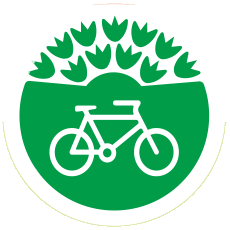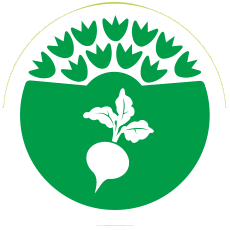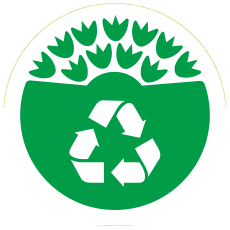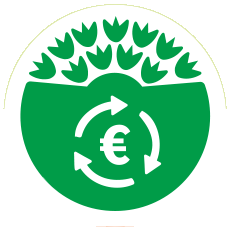The UN has set seventeen Sustainable Development Goals (SDGs) for 2030. These goals are to make the world a nicer place to live. For everyone. To make sustainable development practical and concrete for Eco-teams, Eco-Schools uses ten themes. By working on these themes, your school contributes to the achievement of several of the Sustainable Development Goals, for example in the areas of waste, food, biodiversity or climate.
There are ten themes from which your Eco-team can choose to tackle sustainability in and around the school. The Eco-team decides which themes to focus on. This is done based on the results of the Eco-scan and the interests and values of the students. The themes that are chosen determine the focus of the school: on which themes will the school take sustainable steps? Below you can read what each theme exactly entails. Which themes would you like to work on?

Climate
|
|
The climate is changing: the emission of CO2 and other greenhouse gases is causing the earth to warm up at a rapid pace. What is the effect of this on the quality of life on earth and how can you do something about it? In this theme we look at what climate change exactly is and we examine your role as an activist for the climate. You will take a broad, global view of the problem and look for solutions. You'll explore links between behavior and climate change and come up with actions to get your school moving to combat climate change and adapt the school environment to the changing climate. By working on this theme, you will contribute to climate awareness at the school, take joint action for the climate and work on climate adaptation. With this theme, you bring out the bigger picture of a sustainable school! |
Nature
 |
What about nature in area around school? Are there many plants, birds and insects to be found? This topic focuses on how you can make nature flourish (again) in and around your school and how to ensure more biodiversity in the area. Think of a green schoolyard, planting flowers to combat bee mortality and taking action to protect the forest in your area. Knowledge about plants, animals, ecosystems and biodiversity are all covered in this theme. By working on the theme of nature, you ensure that the school and the environment (again) becomes a green, lively and healthy environment full of life! |
Water
 |
Water: what would we do without it? The earth is made up of as much as 70% water and is an essential resource for all life on earth. What could you do to ensure that the water in your neighborhood can become clean and full of life again? And how can you reduce water use at school? By working on this topic, you can not only contribute to clean water in your neighborhood, but also worldwide. In addition, by conserving water, you can combat water shortages and adapt yourself as a school to the changing climate. |
Energy
 |
Solar panels, wind turbines, coal or oil: these are all sources of energy, but they are not all sustainable. Which energy sources are future-proof and can you use to make your school more sustainable? There are also many other topics within this theme that you can focus on. Think for example of energy conservation, actions such as Warmetruiendag, solar panels on your school building, sustainable use of ICT and together reducing the number of shower minutes at school. By working with the energy theme, you contribute to clean air and a school that is ready for the future: no more contribution to climate change! |
Transport
 |
Do you walk, bike, bus or car to school? And how do you travel to your vacation destination? These choices contribute to your CO2 emissions, and therefore also to climate change and air pollution. What can you as an Eco-team do to promote sustainable transport for school trips and to motivate your classmates to choose the train more often instead of the plane for vacations? How can you make sure that everyone who can, rides a bike to school and that there are enough bike racks and charging stations for electric scooters and cars? These are some examples you can focus on with this theme. By working on the theme of transportation, you contribute to clean, healthy air and fight together against climate change. |
Food
 |
Fruit, vegetables, meat, fish or plants: the food choices we make every day not only affect our health, but also the health of the planet. By consciously choosing sustainable options, you can ensure a substantial reduction in greenhouse gas emissions, a reduction in land and water use, and more animal welfare and biodiversity. And food has not such a small impact either! In fact, what we eat accounts for as much as 20% to 30% of our environmental impact (Milieu-Central, 2021). But which food is the most sustainable? What is the impact of organic, regional and seasonal? And how can I get other students to choose sustainable options too? In this theme, you will dive into the issues surrounding the impact of the production and consumption of different foods on people & the environment and food waste. By working on this theme you will contribute to the health of people, animals and the planet. |
Waste
 |
Old smartphones, clothing and food packaging: waste comes from everywhere. The theme of waste involves looking at how to prevent litter, reduce waste, separate, upcycle and recycle. For example, think about the waste from lunch that is thrown on the square and ends up in the ditch. What is the environmental impact of this and what could you all do to reduce this impact? If you want to work towards a clean neighbourhood, stop resource depletion, reduce CO2 and save water, then this topic is of interest to you! |
Things
 |
Smartphones, clothes, gifts and games: all our things have an impact on the climate. For example, items have to be produced and often make a long journey around the world before they reach the stores. And that takes raw materials, energy and water. In fact, buying new things accounts for almost one third of household CO2 emissions (Milieu Central, 2021). How can you make sure your belongings lasts longer? And what can you do to encourage each other to buy less things and to promote second-hand, longer-use and sustainable alternatives? By working on this theme you can fight against the depletion of resources, the throw-away culture, child labour and climate change. In this way, a contribution is made to a fair, clean and sustainable world. |
Money
 |
Money plays an important role in today's world. What does your money contribute to? And is that really what you want to contribute? For example: which chocolate brands are there of which you know for sure that your money ends up with a cocoa farmer in Africa who is doing good? And does your bank invest in solar panels or does your money end up in the industry? Topics such as poverty, wealth, (sustainable) economies and sustainable banking are covered in this theme. By working on this theme, you will learn how you can use and spend your money for more sustainable production of food and things, how different economies influence the environment and how your money can contribute to a sustainable society. If you think it is important to learn how your money can make the world more sustainable, then this topic is definitely of interest to you! |
People
 |
How do you experience the atmosphere at school? Do you feel respected in society? Can you, and do you dare to, be yourself? In this theme you deal with issues such as diversity, cultural identity, (gender) equality, respect and peace. You investigate the role between these social themes and your own behaviour. For example, what can you do to make LGBTQ+ people at school feel respected? How do you make sure that there is no bullying and that everyone counts and can be themselves? In addition, you will investigate what drives people to live sustainably: what is the influence of the social environment, how can I motivate people? By working on this theme, you contribute to a school where everyone counts, feels valued and participates. You will get to know your own identity and that of others better. If you find it important to create an atmosphere in school where everyone feels at home and wants to contribute to sustainability, then this theme is for you! |


.jpg)
